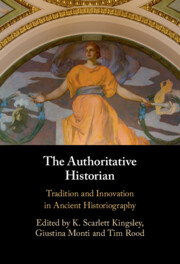Book contents
- The Authoritative Historian
- The Authoritative Historian
- Copyright page
- Dedication
- Contents
- Contributors
- Preface
- Abbreviations
- Introduction
- Part I Myth, Fiction, and the Historian’s Authority
- Part II Dislocating Authority in Herodotus’ Histories
- Part III Performing Collective and Personal Authority
- Part IV Generic Transformations
- Chapter 13 Thucydides’ Mytilenaean Debate
- Chapter 14 Tradition, Innovation, and Authority
- Chapter 15 Tradition and Authority in Philostratus’ Lives of the Sophists
- Part V Innovation within Tradition
- Bibliography
- Index Locorum
- General Index
Chapter 14 - Tradition, Innovation, and Authority
Caesar’s Historical Ambitions
from Part IV - Generic Transformations
Published online by Cambridge University Press: 02 December 2022
- The Authoritative Historian
- The Authoritative Historian
- Copyright page
- Dedication
- Contents
- Contributors
- Preface
- Abbreviations
- Introduction
- Part I Myth, Fiction, and the Historian’s Authority
- Part II Dislocating Authority in Herodotus’ Histories
- Part III Performing Collective and Personal Authority
- Part IV Generic Transformations
- Chapter 13 Thucydides’ Mytilenaean Debate
- Chapter 14 Tradition, Innovation, and Authority
- Chapter 15 Tradition and Authority in Philostratus’ Lives of the Sophists
- Part V Innovation within Tradition
- Bibliography
- Index Locorum
- General Index
Summary
Caesar is known as one of the most brilliant and successful generals in world history. In his commentarii he described two series of his wars. In the first, in Gaul from 58 to 50 BC, he extended the Roman frontier to the Atlantic, British Channel, and Rhine river. The seven books of his Gallic War, on which I focus in this essay, end with his victory over a pan-Gallic alliance under Vercingetorix in 52. The second series of campaigns was conducted in 49–48 in a civil war with Pompey in Italy, Spain, and the Balkan peninsula, culminating in Caesar’s victory in Thessaly and the death of Pompey in Egypt. These campaigns are described in three books of the Civil War, ending with the outbreak of a new war with the Egyptian king’s forces.1 Pieces written by some of Caesar’s officers provide additional information. The eighth book of the Gallic War, authored by Caesar’s adjutant Hirtius (consul in 43), covers Caesar’s last two years in Gaul, while the anonymous Alexandrian, African, and Spanish Wars describe a series of later wars and civil wars that took place from 47 to 45 in Egypt, eastern Anatolia, the Adriatic, the province of Africa (modern Tunisia), and south-western Spain.2
- Type
- Chapter
- Information
- The Authoritative HistorianTradition and Innovation in Ancient Historiography, pp. 271 - 291Publisher: Cambridge University PressPrint publication year: 2023



